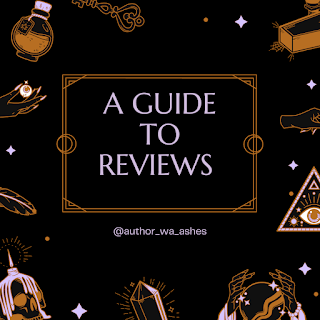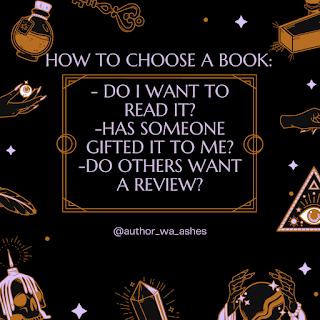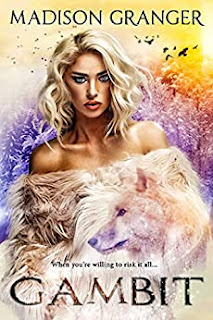A Guide to Reviewing Books: From an Author to the Reader and Vice Versa
Reviewing, in and of itself, is an art form. As a reader, reviews can help you decide if you want to read a specific book. As an author, reviews help you procure advertising and become a better writer. I did a piece on how I go about reviewing books a while ago on my Instagram page. It was almost a year ago, I think, so I figured it was time to do another one. Especially since people are starting to notice my reviewer status.
Before I begin, let me say that being a reviewer is not a job for me. I don't get paid for it. It's something I do to help fellow readers and authors. Both of us depend on reviews. Readers use reviews to determine whether they want to read a book or not. Authors can get free advertising from sites like Amazon for having reviews, they also can get Best Seller Rankings when they hit 500 reviews, and reviews help show them how they can improve their writings and what they do well.
It's important to take several elements into consideration when reviewing. In this post, I'm going to break down my reviewing process for you all and give you some tips for crafting great reviews. That sounds like I'm bragging, but I'm really not. Reviewing is something I've been 'studying' for a while now.
The first step in reviewing any book is to choose a book. However, how do you choose a book when there are so many out there and only so much time? You don't want to spend your life reading books you don't like. We all have neverending reading lists that we slowly chip away at and reading books we don't like takes away precious time we could be spending on another that we love.
So, the most important thing to consider when picking a book to review is if YOU want to read it. If you don't want to, then don't review it. It's as simple as that. There are a couple exceptions to this rule, however.
1) Has someone gifted you the book?
Occasionally I'll have an author DM or PM me asking if I would review their book in exchange for a free ebook copy of the book. I usually agree to these because I'm not out anything if I don't like the book and they're asking for honest feedback. I'm not going to sugarcoat the review just because they give me the book for free, and I make that clear to the author, but if they give me the book I immediately start reading it and get the review up as soon as possible.
2) Do others want a review?
Twice a month I offer my followers the chance to choose which book I review. I give them a stack of paperbacks and a list of ebooks. They then vote for one book from each pile that they'd like to see reviewed. I usually do the paperbacks towards the end of the month and the ebooks towards the middle of the month. The books with the most votes are the ones I review.
Here's a trick though, I only offer them books to vote on that I actually want to read. They're usually books that are either new releases or have been on my TBR for a really long time. I also try to make sure there are various genres represented. Most of the books I review are fantasy, so when I let my followers pick I like to throw in some contemporary romance or historical fiction.
I have a very simple 'grading sheet' I follow for reviews. I came up for them when I was teaching 5th Graders how to review books in a library class. A 1 black heart rating means there is no chance I will ever read the book again, two black hearts mean I didn't like the book, three mean it's an average book, four mean I liked the book, and five black hearts means I would read the book again. I tend to give a lot of 3-5 black heart reviews. Rarely do I go below 3 hearts, and that's because I'm picky with the books I read. Like I said above, I always choose a book I want to read.
There are things in my reviews that can change how many hearts a book gets besides just my general liking or dislike of the story. I add hearts for uniqueness, plot twists, and unpredictability. I subtract hearts for predictability, distracting grammar/spelling errors (yes, I know the spelling is wrong in the graphic).
For example. Let's pretend the graphic above is a book. It outlines what it needs to, it's readable and flows...no problem there. Then..oops...spelling is wrong. If this were a book, that one mistake would not change my review. Authors are human. Editors are human. Grammar and spelling mistakes are stubborn and some slip through unnoticed. However, if the graphic read:
Teh Math of Harts:
+1: Uniquenesss
+1: Plote Twist
+1; Unpredictabilityness
-!: Predicktable
-1: Distracting
-1: Cliche Or OvErused Plot
Look at all those mistakes. My grammar assistant is cringing right now and I bet you couldn't read that without wanting to fix everything wrong. A mistake here and there is human, mistakes everywhere are laziness and, frankly, they're distracting and make stories hard to enjoy. Thus, I drop a star for such mistakes.
Reviewing a book is more than just hearts and stars. When you write the review you need to pay attention to some dos and don'ts.
The author of the book poured a lot of time and energy into the book you read, so be sure to be respectful. Never bully an author. That's a sure-fire way to get yourself reported. Authors are artists. Their books are their babies. You wouldn't want someone walking up to your child, saying, "What the heck did you make? There's no point to it. Its ears are too big, its eyes are too small, and why is its skin blue?" It's just plain rude. Always, always, always (I can't stress this enough) be respectful.
The second thing to pay attention to when writing your review is that you aren't giving them sugar when they need medicine. You need to be respectful, but you need to be honest too. This is where the art of communication and tact comes in. Use your people skills to kindly give a review that is both honest and respectful. You can give a book a 1 heart rating and still be kind. It's all about word choices.
If you're an author, DON'T BUY REVIEWS. Honest reviews are more important than 5 heart reviews. If you pay for a review then you could either be getting scammed or may not receive the right kind of feedback because the reviewer wasn't genuinely interested enough in your work in the first place to buy the book themselves.
If you're a reader, DON'T SELL REVIEWS. Reviews should be done because you read the book and want to help the author or other readers. They shouldn't be done for money. And, yeah, I know there are reviewers out there that make a living off selling reviews. No, I don't agree with them. Honestly, and this is MY opinion, I find their reviews flawed because they have the motive of being paid.
The last two things you should consider when writing your reviews are opinions. I read reviews to find out if I may like a book, but I NEVER TAKE THOSE REVIEWS INTO CONSIDERATION WHILE REVIEWING. Your review should not be based on other people's reviews. It should solely be based on your own feelings. That being said, you can point out that you don't understand why a book has a certain rating. For instance, I recently reviewed a book that had an average 2 heart rating. I gave the book 5 hearts. This book only had two reviews. Mine and the other person's. I stated in my review that I didn't understand why the book's overall rating was so low because I enjoyed the book and then I laid out my reasoning as to why I enjoyed it. That's okay, but don't name reviewers in your reviews. Okay. That other person didn't like the book. They probably didn't understand why I gave it a 5 heart review. You're going to have differences in opinions, it's okay to acknowledge them, just be sure to always be respectful.
The last thing I want to talk about concerning reviewing is DNFs. DNFs, or Did Not Finish, are rare for book lovers, but they happen to all of us at least once in our lives. Not every book you read is going to be a home run. That's just reality. The world is made up of different kinds of people with different likes and dislikes. If you like the classics and read a modern you might not find it enjoyable. It's okay to not finish books if you don't like them.
If you DNF a book here's a few things to keep in mind. Firstly, I like to follow the 40 Page Rule. This rule states that you don't stop reading a book until you reach page 40. 40 pages are plenty of time for the author to set up the story and get the plot going. By page 40 you should know:
1) Who the main character is
2) What the setting is
3) A vague idea of what the conflict is
If I reach page 40 without knowing any of the above things, I DNF.
If you DNF you have two choices. You can either not review the book or leave a respectful (there's that word again) and honest review. If you decided to review the book then make sure you state in the review that you did not finish reading the book and try to give some sort of idea of how far you got into the story. Also, a rule I like to follow is don't leave a 1 or 2 heart review. It's not fair to the author. You didn't finish the book. You have no idea if there are plot twists if the pace picks up, or how it ends. You barely have enough information to judge grammar. If I review a DNF I always give the book a solid 3 hearts. It's an average review that won't hurt the author's overall rating.
Are you a reviewer that has any tips for those wanting to get into reviewing books? Leave me a comment and let me know.









Comments
Post a Comment